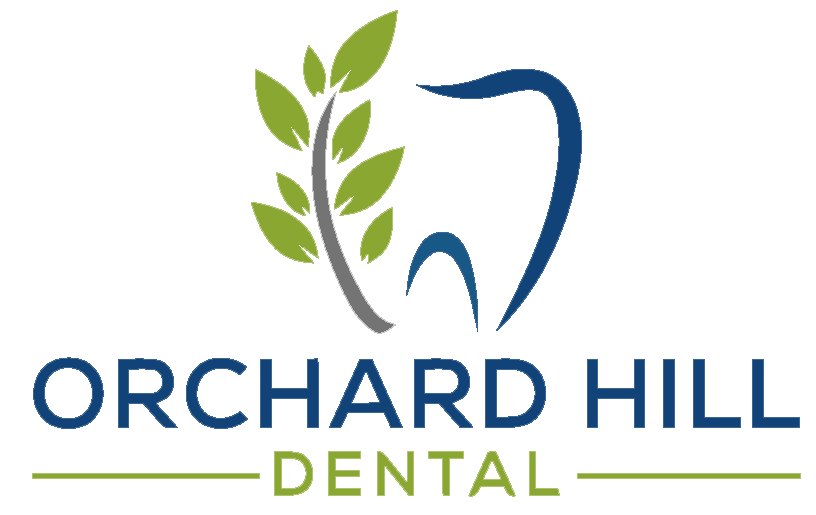Your dentist in Hendersonville, NC, offers options that help patients replace missing teeth, treat gum disease, or alleviate the impact of bite problems and TMJ, such as facial and jaw pain. Dr. Jessica Christy offers personalized treatment plans and dental services to support healthy, comfortable, and functional smiles after damage, trauma, and tooth loss.
If you have been suffering from poor oral health, or have concerns about the stability of your smile, schedule an appointment in our Hendersonville, NC, dentist office to explore your treatment options and learn more about the benefits of restorative dentistry.

Restorative Dental Care in Hendersonville, NC
Dental Bridge
Dental bridges can be used to replace one or more consecutive teeth. They utilize the support of your surrounding teeth the hold a prosthetic tooth in the empty space and fill in the gaps of your smile.
Dental Crown
A dental crown acts as a cap that covers and protects teeth. They are used to cover damaged, misshapen, or discolored teeth, as well as hold dental bridges in place or to cover dental implants. Made of sturdy porcelain ceramic material, dental crowns strengthen weak teeth and blend in with natural teeth. Dental crowns are custom-fit to each patient for personalized treatment.
Dental Implants
Are you looking for a more balanced smile? Replace the gaps in your smile with dental implants. Dental implants consist of a titanium post, abutment, and dental crown that are custom-fit to each patient. We will insert the titanium post, which will then fuse to bone tissue over a healing period of three to six months. After this period, the abutment and custom dental crown will be attached to the post.
This restorative solution not only improves the form and function of a patient’s bite but also provides them with a more balanced smile.
Dentures & Partials
If you need customized dentures or partials to restore a full arch of teeth, we can provide this for you. We ensure that our dentures fit comfortably and securely into your mouth. Implant-secured dentures offer a more permanent solution.
Periodontal Disease Treatment
Our dental team helps patients with gum disease receive the treatment they need. Periodontal disease treatment removes bacteria and buildup from the gum line. We will remove any infected tissue to prevent further tissue loss or future tooth loss. To learn more about Dr. Jessica Christy’s periodontal therapy options, see Periodontal disease treatment.
TMJ Treatment
TMJ, or temporomandibular joint disorder, is a condition that can cause teeth clenching and grinding as well as jaw pain. The goal of TMJ treatment is to relieve the negative effects of jaw pain and bruxism. Dr. Christy may recommend customized night guards or oral surgery to help reposition the jaw and avoid muscle strain. For more information on our TMJ remedies, see TMJ treatments.
Why Restorative Dentistry is Necessary
Restorative dentistry is essential for maintaining your teeth’ health, function, and appearance. Over time, teeth can become damaged, decayed, or lost due to various reasons, such as poor oral hygiene, trauma, or aging. When this happens, restorative dentistry repairs and restores your smile, ensuring that you can continue to eat, speak, and smile confidently.
One of the main reasons restorative dentistry is necessary is to fix cavities or tooth decay. Cavities are caused by bacteria in the mouth that break down the enamel on your teeth, leading to small holes or damage. These cavities can worsen if left untreated, causing pain, infection, or even tooth loss. Restorative procedures, like fillings or crowns, repair these areas and prevent further damage. By addressing cavities early on, restorative dentistry can save your natural teeth and keep your smile intact.
Another important reason for restorative dentistry is to replace missing or lost teeth. Teeth can be lost due to decay, gum disease, or injury. When a tooth is missing, it can cause several issues. The remaining teeth may shift out of place, leading to bite problems or discomfort.
Also, missing teeth can affect your ability to chew properly and even make you self-conscious about your smile. In restorative dentistry, dental implants, bridges, or dentures commonly replace missing teeth. These treatments help restore function, improve your appearance, and prevent the remaining teeth from shifting.
Restorative dentistry is also necessary to address damaged or broken teeth. Whether a tooth has been cracked from an accident or weakened by years of wear and tear, it can cause discomfort or even become infected. Restorative treatments like crowns or dental bonding can strengthen and protect these damaged teeth. By restoring a tooth to its original shape and function, restorative dentistry helps avoid more serious issues, such as tooth loss or the need for more invasive treatments.
In some cases, restorative dentistry treats gum disease, which can lead to tooth loss if left untreated. Procedures like root planing or scaling can help remove the bacteria and plaque from the gums, allowing them to heal and reducing the risk of further tooth damage. Restorative dentistry addresses the tooth itself and focuses on overall oral health, ensuring that the gums and surrounding structures are healthy.
Restorative Dentistry FAQs
Restorative dentistry gives you back the full function of your smile. Learn more by reading the answers to these frequently asked questions.
What is restorative dentistry?
Restorative dentistry focuses on repairing or replacing damaged or missing teeth. It includes treatments like fillings, crowns, bridges, and dental implants. The goal is to restore your smile’s function, appearance, and health.
Can restorative dentistry improve my smile?
Yes, restorative dentistry repairs damaged teeth and enhances your smile’s appearance. Procedures like fillings, crowns, and veneers can improve your teeth’s shape, color, and alignment, giving you a healthier and more attractive smile.
How long do restorative dental treatments last?
The lifespan of restorative treatments varies depending on the type, oral hygiene, and how well you care for your teeth. Fillings can last around 5-15 years, crowns and bridges can last 10-15 years, and implants can last a lifetime with proper care.
Is restorative dentistry painful?
Most restorative procedures are not painful because dentists use local anesthesia to numb the area. You might feel some pressure or mild discomfort, but it’s usually manageable. After the procedure, any soreness typically goes away in a few days.
How much do restorative dental procedures cost?
The cost varies depending on the procedure, the materials used, and your location. Fillings are generally the least expensive, while crowns, bridges, and implants can be more costly. Many dental insurance plans cover some of the costs of restorative treatments, so it’s good to check your coverage.
How can I take care of my restored teeth?
Caring for restored teeth involves regular brushing, flossing, and dental check-ups. Avoid biting down on hard objects and maintain good oral hygiene to prevent decay around the restorations. Following your dentist’s advice will help your restorations last longer.
Request a Dental Exam & Consultation
Do you have missing teeth? Are you suffering from jaw pain? Call Orchard Hill Dental today at (828) 247-7001. You may also schedule an appointment with our dental team on our website. Patient comfort and quality of care are our top priorities. Feel free to ask any questions you may have about our restorative solutions. Our dentists will be happy to help.
